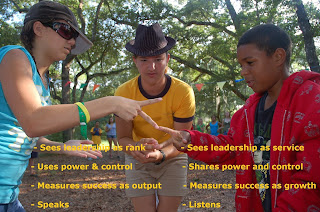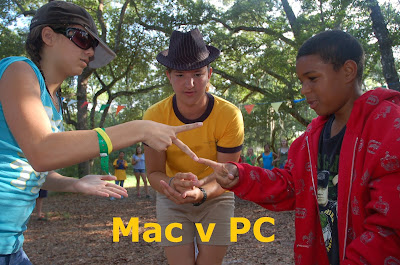With that, I’d like to share a bit about Mac. He came to camp to help lead our leaders in training program (LITs). He had an excellent interview and he talked a great deal about service. Mac’s references talked about his great work with teens. Mac said he was looking for a new opportunity to learn and grow as part of a team.
PC had been there a while and was our operations leader and essentially, our second in command if that is a style you would be familiar. PC had taken it upon himself to specialize in multiple certifications in different areas of camp. I had one staff person refer to PC as an overachiever.
Mac wanted to be creative and try different things with the program. PC was always putting schedules together and creating order in what many camp folks know as chaos.
This is their story from one late evening at camp:
It was about the middle of the fifth week of camp. Folks had begun to settle well into their roles and the initial round of storming was nearly two or three weeks in the past. I had gone home (across the street) for the evening and most of this is what I collected as to what actually happened and those involved.
PC was working at a station in the office (where internet was available) to download and create the next sessions rosters, activity list, check in forms for parents, the nurse and swim test. His work never seemed to be complete, yet he was always working a week ahead to make sure that operationally things ran well. PC also ran all the risk management issues for camp and he would often meet and review drills with key staff like the Aquatics Leadership staff. He helped prep their weekly swim tests and lifeguard drills as well as often substituting himself to give guards a break throughout the day. It was just a way to be of service.
Mac was in the office late that evening working on plans for the end of the next session of the LIT program. In spending well over a month at camp, Mac was indeed making great headway with his LITs and they were enthralled with his personality. They loved him and each day, they wanted to be more like him, adopting his style of language, and wanting to spend more time with him. They wanted to hear more of what he had to say; and in turn he wanted them to hear more of what he would say. He spent most of his days weighing in with other staff as to how his LITs needed to be managed. Often, Mac was now telling activity leaders what his expectations were for each individual LIT assigned and how he wanted to check in with them each day.
In walked one of the unit leaders, James, who was looking for advice from our assistant program director (Jeff) on an issue in the unit. Mac, overhearing decided that he would intervene. The conversation went nowhere fast as Mac decided to offer his opinion on how James needed to crack down on his people to make sure they were following the rules. He told James to “man up” or he would get run over. The Jeff’s jaw dropped and asked Mac to excuse himself from the conversation. Mac decided that his opinion was the only one that mattered and it was about time that James learned a thing or two about managing people. He quickly pointed out how his LITs followed all his rules and didn’t do anything without checking with him first.
By the time that Mac had denigrated James several more times, PC walked into the room overhearing the escalating voice. At that point, PC excused everyone (with the exception of Mac) from the room in what was later described to me as the most commanding tone that any of them had ever heard. Jeff called me on my cell and as I answered and heard the shakiness of his voice as he asked for me to come back over because “PC and Mac were having it out in the office.”
Within minutes I had come back across for my home and met James and Jeff in the driveway in front of the office. I could hear Mac inside but was unable to make out what he was saying. Jeff told me that Mac had been inappropriate with James and when PC intervened, Mac got boiling hot. I walked into the office.
PC was sitting in a chair, hands clasped in what appeared to be a listening stance that I had grown to expect from him. Mac was pacing and talking about how people at that camp needed to manage their staff of he would do it himself. I sat on the desk with my back up against the wall and asked “I’d like to know what has been going on, Mac, let’s start with you.”
Within 15 minutes, we had reached a state of truce and agreements as to how we would proceed and behave. I can’t claim credit for that since PC had already initiated most of what needed to occur. He wanted there to be growth as a result of the experience and I concurred. The rest of that summer became about the leadership cult of Mac versus the value of service from as exemplified by PC. Lessons learned.
 |
| MAC vs PC - lessons in servant leadership |
I am sure by now, it is clear what the styles of leadership are demonstrated here. I heard the term "Servant Leader" as far back as early as the late fall of 1985 when I was asked by Wally Wirick (one of my first mentors at Bluff Lake and beyond) to consider working at camp that next summer. He and Sam Brown (who ran the downtown YMCA in Pasadena) had just spent a retreat in San Diego learning with Rich Collato (also a Y mentor) about how to support your staff to success so we are all successful.
That journey of servant leadership and the subsequent displays of the traditional hierarchical leadership have equipped me to know that the better model is PC over Mac.







